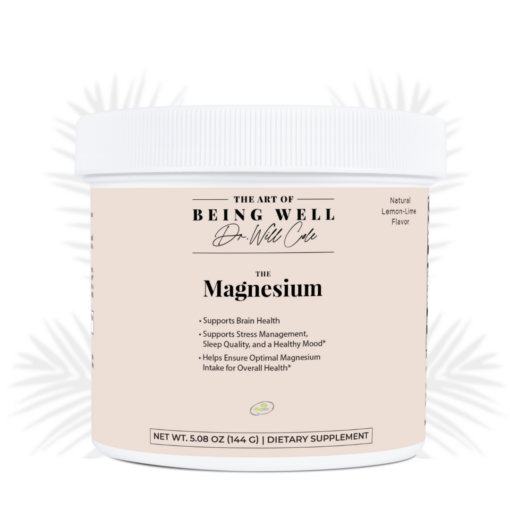6 Natural Remedies for Migraine Relief At Home

Headaches, which can range from a hint of tension behind the eyes to full-blown, debilitating migraines, are one of the most common health woes in the world. A simple headache isn’t always the worst thing, but if you are someone who deals with migraines regularly, you may be wondering how to get rid of migraines.
But first, what is a migraine, exactly? They definitely aren’t just a headache. They occur when the blood vessels in the head tense up and cause throbbing and pain. Migraines can also last longer and come with a host of other symptoms, such as:
- Sensitivity to light and/or sound
- Blurred vision
- Dizziness
- Nausea and/or vomiting
This combination of uncomfortable symptoms can leave you unable to do anything other than lay in your bed and wait for relief.
ARTICLE CONTINUES BELOW
As a functional medicine practitioner, I specialize in finding natural remedies for headaches and migraines. Below are my favorite simple tools for migraine relief at home.
1. Experiment with essential oils
Essential oils are extracts of highly concentrated plant compounds that can be used for anything from immune support to relaxation. This healing modality is called aromatherapy. You can use essential oils by inhaling them through a diffuser or by putting them onto your skin. Peppermint and lavender are my essential oils of choice.
2. Give an elimination diet a shot
Your headaches might be connected to the foods you’re eating. Food intolerances can cause a slew of health issues, including migraines (1). In fact, one study even showed that migraine occurrences decreased (2) in those who did an elimination diet. What’s an elimination diet? It’s a process that involves eliminating common problem foods for a certain period of time, and then adding foods back in one-by-one and observing your symptoms. This can help you pinpoint exactly which foods your body gets along with, and even more importantly, which ones it doesn’t. My book, The Inflammation Spectrum, walks you through exactly how to do an elimination diet.
3. Stock up on magnesium
Magnesium is the fourth most abundant mineral in your body and essential for a ton of different bodily functions. Knowing this, it won’t come as a huge surprise that up to 50% of migraine sufferers are deficient in magnesium and as much as 60% of sufferers have genetic mutations that inhibit magnesium metabolism.
The good news is that eating more magnesium-rich foods — like dark leafy greens, nuts and seeds, and fatty fish like salmon — can help. You can also try powdered magnesium supplements or try IV magnesium sulfate. When it comes to migraines, magnesium is a “must try.”
4. Set boundaries
This may be one of the biggest home remedies for migraines. Stress is a known cause of migraines and oftentimes, our approach to stress is more about managing stress instead of preventing it. So while you can’t eliminate stress from your life completely (I wish!), setting boundaries with your phone, your friends, your boss, and your family members can keep you from spinning out and ending up with a migraine. If you’re not sure where to start, try these suggestions:
- Spend 30 minutes each day without your phone. Lock it in a closet or put it in a drawer and spend that time reading, journaling, or walking.
- Vow to log off your work email at 9 p.m. unless there’s a true emergency.
- Commit to 20 minutes of yoga each day.
5. Do yoga
Speaking of yoga, having a regular yoga practice increases blood flow and relaxes muscles, which can be what helps with migraines. Research has shown that incorporating a regular yoga practice in conjunction with other migraine treatments can provide more relief than just treatment alone (3). There are a ton of free yoga resources online, try a restorative class from PopSugar Fitness or these 10 poses from mindbodygreen and get yoga-ing right in your own home.
5. Try feverfew
In addition to natural minerals like magnesium, the earth has given us an abundance of natural plant and herbal remedies. Feverfew is a plant that has been studied for its ability to help alleviate migraine pain due to its anti-inflammatory abilities. While more research needs to be done around this herb, some studies have shown that supplementing anywhere between 50 to 150mg per day can reduce migraine frequency (4). If you suffer from frequent migraines, it’s definitely worth a try.
Migraines can be incredibly painful and frustrating, but leaning on these six tips and tricks might just make the difference.
As one of the first functional medicine telehealth clinics in the world, we provide webcam health consultations for people around the globe.
Start Your Health Journey Today
FUNCTIONAL MEDICINE CONSULTATIONS FOR PEOPLE AROUND THE WORLD
The information on this website has not been evaluated by the Food & Drug Administration or any other medical body. We do not aim to diagnose, treat, cure or prevent any illness or disease. Information is shared for educational purposes only. You must consult your doctor before acting on any content on this website, especially if you are pregnant, nursing, taking medication, or have a medical condition.
Our content may include products that have been independently chosen and recommended by Dr. Will Cole and our editors. If you purchase something mentioned in this article, we may earn a small commission.

BY DR. WILL COLE
Dr. Will Cole, DNM, IFMCP, DC is a leading functional medicine expert who consults people around the globe, starting one of the first functional medicine telehealth centers in the world. Named one of the top 50 functional and integrative doctors in the nation, Dr. Will Cole provides a functional medicine approach for thyroid issues, autoimmune conditions, hormonal imbalances, digestive disorders, and brain problems. He is also the host of the popular The Art of Being Well podcast and the New York Times bestselling author of Intuitive Fasting, Ketotarian, Gut Feelings, and The Inflammation Spectrum.

Gut Feelings
Healing The Shame-Fueled Relationship
Between What You Eat And How You Feel



